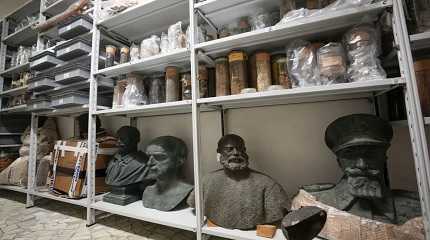
ROME (AP) — For decades, Italy has worked to recover ancient Roman-era statues, Etruscan vases and other treasures that were looted from its soil and sold to museums around the world. Now, the country is coming to terms with the fact that it, too, has stolen items in its museum collections: the relics of a brutal colonial empire in North Africa that it hasn’t fully reckoned with.
For over a year, a team of museum directors, university researchers and scholars has been conducting a “census” of the collections in the 498 Italian state museums to get a handle on what exactly they contain. The aim is to provide government authorities with preliminary data of the weapons, artifacts, and ritual objects Italian museums may hold, to respond to requests for restitution that have only increased amid a general reckoning over the legacies of European colonial empires and the related racial justice movements.
The survey comes as museums and governments across Europe and the Americas have undergone a sea change in giving back cultural artifacts to countries and communities of origin. These museums reason they can no longer hold the objects in good conscience if they were acquired as a result of historical violence, colonial occupation, looting or war.
Even the Vatican has gotten onto the restitution bandwagon, recently returning to Greece the three fragments of the Parthenon Marbles that it had held for two centuries. “For starters, there’s the Seventh Commandment: If you steal something, you have to give it back,” Pope Francis explained.
The Italian audit, begun under the previous government, is continuing under Premier Giorgia Meloni, whose Brothers of Italy party has its roots in the neo-fascist successor party of dictator Benito Mussoli. Mussolini’s Fascist regime is most closely associated with Italy’s North African colonies, which covered Eritrea, Ethiopia, Libya and Somalia as well as a protectorate in Albania. The empire began in the late 19th century, but Mussolini tried to expand it, only to be forced to relinquish it after World War II, with Italy’s final administration of Somalia ending in 1960.
“Even though we had a more ephemeral colonial history than Britain, Germany, France or Belgium, the problem obviously cannot be underestimated by us,” the Culture Ministry official in charge of museums, Massimo Osanna, told a recent conference on restitution. “We must rethink the collections, rethink the institutions and rethink the transparency of the narrative, as well as case-by-case restitutions.”
Osanna has tasked a group of museum directors and academics, headed by Christian Greco, director of the Egyptian Museum in Turin, with the audit. The committee has enlisted a dozen graduate students who are helping curators go through their storerooms and archives to understand what’s there.
In an interview, Greco acknowledged the issue of restitution and Italy’s colonial past remains sensitive. He said he had expected resistance when his team sent out a questionnaire asking museums if they held objects that may have been acquired in ways that would be considered unethical today.
“I was expecting people to be afraid, but actually the contrary is happening, people are very excited that this is happening,” he said, adding that 30 museums with substantial collections had already responded. The aim is to produce a report to the Culture Ministry by mid-year, and to then organize an international symposium in the second half of the year to discuss the findings.
“Objects just don’t necessarily tell us about the past, they tell a lot about us,” Greco said. “When I look at objects of ancient Egypt, do they tell me something about ancient Egyptian civilizations, or do they tell me much more about Eurocentrism?”
“I was expecting people to be afraid, but actually the contrary is happening, people are very excited that this is happening,” he said, adding that 30 museums with substantial collections had already responded. The aim is to produce a report to the Culture Ministry by mid-year, and to then organize an international symposium in the second half of the year to discuss the findings.
“Objects just don’t necessarily tell us about the past, they tell a lot about us,” Greco said. “When I look at objects of ancient Egypt, do they tell me something about ancient Egyptian civilizations, or do they tell me much more about Eurocentrism?”




